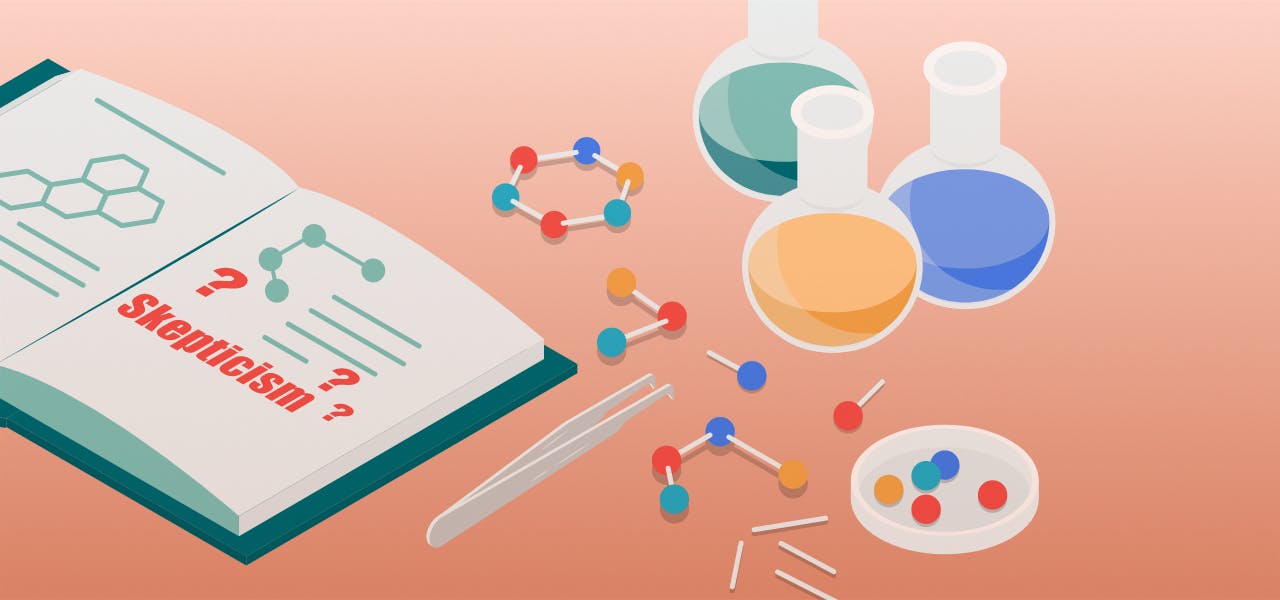Keeping bias out of research is an essential part of science. If the audience reading the outcome can’t trust its steps to be completely neutral, how can they believe in the authenticity of the final results?
This is a no-brainer, of course … until the idea of skepticism is brought up. Isn’t skepticism, by nature, a form of bias? Yet, the need for healthy skepticism is just as crucial as the requirement of keeping bias out of the science. How do the two balance?
Skepticism can be an inhibitor of research if it’s used incorrectly. A skeptic can consciously or subconsciously prevent the natural conclusion of an experiment from occurring. But a healthy skeptic understands that this characteristic is part of helping scientific achievement advance to its furthest levels. A healthy skeptic doesn’t accept results at face value, instead preferring to challenge the expectations to see if they can authentically reach the expected conclusion. Trying to find the perfect balance to create this healthy skepticism is the learned scholar’s goal so they can remain neutral and eliminate bias while still remaining open-minded to the possibility of being wrong.
Emotions Versus Evidence
The difficulty of this failure-oriented thinking is that many researchers go into the field in the hopes that they can reveal a truth they believe in strongly. Ecological researchers want to show the world that green technology is beneficial, for instance. Oncology scientists want every potential cure for cancer to work. These emotions are hard to overcome, and when the evidence points to the opposite of what the researcher is looking for, it can be hard.
With so much confusion in the world today as it is, it’s hard to discern the truth behind one’s emotions. Many viewers believe whatever they hear or see because it was on the internet, shared on social media, or seen on TV. Because of the inundation of certain ideas on these forms of media, people have a difficult time discerning between what they want to believe and what is evidence-based. This was proven true with COVID-19, when those who chose to believe one way ignored the scientific evidence that pointed in another direction. Emotions dictate skepticism when the facts laid bare before you are things you choose not to believe. Scholars must overcome this emotion-based thinking to cut to the evidence.
Science Denial is Dangerous
There’s skepticism, and then there’s science denial. Skeptics who strongly believe in a “truth”, in such a way that they become close-minded to other potential truths, often become
deniers of science.
Science denial occurs when a person or group rejects all empirical evidence shown to them simply because it leads to results they don’t believe in or want to hear. These undesirable conclusions must be faked because there’s no way to reconcile them with the beliefs the person or group hold, they concur. These denialist concepts have steadily grown over the years and turned into controversial topics like “flat earthers,” anti-vaxxers, evolution, and now, the COVID-19 vaccine.
Science denialism can be annoying at best and deadly at worst. When a person refuses to believe the planet is millions of years old, yet dinosaur bones are pulled out of the earth and carbon-dated as such, scientists must be faking the entire thing. This is annoying, but not inherently dangerous.
But when large groups of people spread their thinking about a medication or vaccine that has significant potential to do good in the world, this perpetuation of misinformation becomes deadly. Healthy skepticism is essential; science denialism is dangerous.
Finding Healthy Skepticism to Further Science
Healthy skepticism in scientific achievement is the best way to ensure that the results that are shared with the public are evidence-based. Denialism, on the other hand, rejects evidence in favor of a belief.
All healthy skepticism in research begins with the null hypothesis. This postulates that any claim set forth is not true until the evidence shows otherwise. It’s the default position of a healthy skeptic’s experiment. They may want it to be true. The results they’ve observed might show that it’s true. But until the research demonstrates its accuracy through evidence, it’s not true.
By using this foundational approach in the scientific method, scholars start out with a dose of healthy skepticism in every hypothesis they make. From there, it’s up to the audience to accept or reject the evidence, and that’s where the healthy skepticism, not science denial, in the public mentality would come in handy.
The Role of Impactio in Healthy Skepticism
Finding a research-designing program that helps you provide clear cut evidence is essential. There will always be science deniers, but if you know you took all the steps to keep healthy skepticism at the forefront of your project, all you have to do is put together the publication and let others believe as they will. Impactio is an all-in-one platform that improves your evidence-based presentation and helps you to look more professional.
Impactio’s premade templates and easy-to-design infographics are at your fingertips for efficient, thorough document creations. Impactio’s network of scholars enhance the professionalism of your research, giving you the connections to take your impactful knowledge and share it with the rest of the world!
